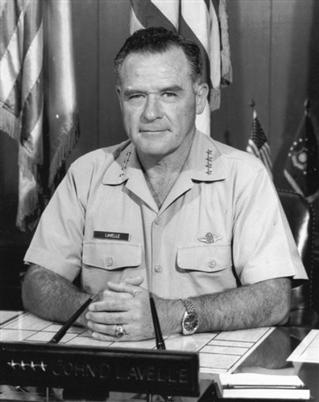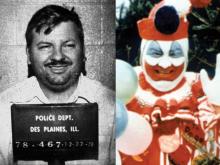
Air Force Gen. John Lavelle
President Richard Nixon’s criminalities and cover-ups continue to be exposed, 36 years after the Watergate scandal forced him from office.
by Don Fulsom
Recently declassified tapes and documents from President Nixon’s archives exploded a bombshell about how Nixon framed and slandered a distinguished U.S. military commander in Vietnam, Air Force Gen. John Lavelle.
In 1972, Lavelle became Nixon’s fall guy for obeying what turned out to be the commander in chief’s own top-secret orders to expand the bombing of North Vietnam in late 1971 and early 1972.
Nixon didn’t want to take the heat for that decision, unpopular with critics of the war—so Lavelle was sacrificed as the scapegoat, stripped of two of his four stars, and sacked.
This decision clearly bothered Nixon. It was too late for remedial action, but Nixon’s conscience was obviously pricked after Lavelle was hung out to dry.
Oval Office tapes released in recent years show Nixon telling National Security Advisor Henry Kissinger: "I don't want to hurt an innocent man” … "Frankly, Henry, I don't feel right about pushing him (Lavelle) into this thing and then, and then giving him a bad rap … "I just don't want him to be made a goat, goddammit."
Yet, Nixon refused to ‘fess up that he had authorized the escalated bombings. In fact, he resorted to a bold-faced lie to hide his own guilt and finger Lavelle—telling a June 26, 1972 press conference the stepped-up assault on SAM missile sites in the north “wasn’t authorized … It was proper for (Lavelle) to be relieved and retired."
In September 1972, Lavelle led off Senate Armed Service Committee hearings prompted by the bombing controversy. He maintained that all of his actions were authorized and taken to protect the lives of airmen in his command. He said he had applied rules of engagement approved by the Joint Chiefs of Staff.
The general told the senators he was just following orders and described his fate as “a catastrophic blemish on my record … for conscientiously doing the job I was expected to do.” Lavelle also vigorously denied an associated charge that he had falsified records about the supposedly unauthorized missions.
President Nixon remained publicly silent during the hearings.
In early October 1972, the panel rejected Lavelle’s nomination for retirement as a lieutenant general. The vote was 14 to two. Instead, he was retired at his permanent rank of major general (two stars), and his name was dragged through the mud as a rogue officer who decided to bomb North Vietnam on his own. (Lavelle never knew for sure that the bombing orders originated with Nixon.)
Lavelle continued to insist on his innocence until his death at age 62 in 1979.
Not until the Air Force article in 2007, were Gen. Lavelle’s good name, top rank and excellent reputation on the way to being fully restored.
The article’s findings were presented to Lavelle's widow, Mary Jo, now 91, and the couple’s seven children. "Jack was a good man, a good husband, a good father and a good officer. I wish he were alive to hear this news," his widow said in a prepared statement.
The Lavelle family chose Patrick Casey, a Pennsylvania lawyer, to try to get the Air Force to reopen the case and restore Lavelle to the rank of full general.
In 2009, the Air Force Board for the Correction of Military Records endorsed the general's exoneration. President Barack Obama and top Pentagon officials have now joined the move—and Gen. John Lavelle’s long journey from scapegoat to hero next goes before the Senate for final approval.
Too bad we had to learn this of this miscarriage of justice—described by The New York Times in 2010 as “a cover-up, cowardice and scapegoating in the Nixon White House”—too many decades too late for Gen. Lavelle to live to see his honor restored.
After the Times ran an account of the Lavelle episode this year, it received a letter to the editor from former CIA Director James Woolsey, who was the general counsel of the 1972 Senate Committee that found Lavelle had exceeded his authority under the written rules of engagement.
But we did not know that President Nixon had ordered General Lavelle, through Ambassador Ellsworth Bunker, to strike the surface-to-air missile sites at will. In my opinion, the evidence is also clear that General Lavelle neither ordered nor knew of false reporting. Mr. Nixon nonetheless publicly charged General Lavelle with exceeding his orders.
Woolsey concluded by saying “had the committee known of Mr. Nixon’s action in 1972, it would have never voted to deny General Lavelle the honor of retiring at the four-star rank he in fact held.”
Journalist Jules Witcover has an astute reaction to Lavelle’s belatedly discovered innocence. In a column in the Daytona Beach News-Journal, he says the case constitutes additional “documented evidence of Nixon's contempt for others and his willingness to let them take the fall for him as needed.” Witcover adds that the Lavelle case provides “reminders of the perfidies, large and small, of our only resigned president.” Like many Nixon junkies, Witcover observes that, with the continuing declassification and release of our 37th president’s tapes and documents … “more evidence of his deceptive nature keeps trickling in.”
Noting that the “only thing the public likes more than a good true-crime story is a good exoneration,” Newsweek likens Lavelle to a number of other innocent “victims of justice gone wrong”—including Joan of Arc; those killed as a result of the Salem witch trials; and Alfred Dreyfus, a French Army officer wrongly accused in 1894—and later cleared—of selling military secrets to Germany.
Did the President’s actions in the Lavelle case—telling millions of citizens on TV that the general was guilty and got what he deserved—actually rise to the level of slander? The definition of this crime is, more or less, the oral communication of false and/or malicious statements injurious to a person’s reputation.
It sure sounds like Nixon met those criteria in Lavelle’s case.
So could the current commander in chief posthumously court-martial a former commander in chief? Or can Nixon be punished, even in death, in some way?
Not likely. Nixon remains the only U.S. President who is above the law. He is immune from prosecution for any presidential crimes he committed—or might have committed—because of a blanket 1974 pardon issued by his handpicked successor, President Gerald Ford.
So just add the freshly revealed slandering of Gen. John Lavelle to the all the other crimes—past and future—that President Richard Nixon will get away with.








